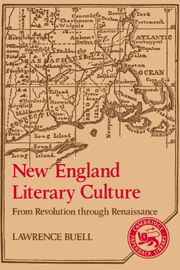Book contents
- Frontmatter
- Contents
- Acknowledgments
- Abbreviations of Frequently Cited Works
- PART I FOUR OVERVIEWS
- PART II THREE REPRESENTATIVE GENRES
- PART III REINVENTING PURITANISM: THE NEW ENGLAND HISTORICAL IMAGINATION
- 8 The Concept of Puritan Ancestry
- 9 The Politics of Historiography
- 10 Fictionalizing Puritan History: Some Problems and Approaches
- 11 Hawthorne and Stowe as Rival Interpreters of New England Puritanism
- Part IV NEW ENGLAND AS A COUNTRY OF THE IMAGINATION: THE SPIRIT OF PLACE
- Postscript
- Appendix Vital Statistics: A Quantitative Analysis of Authorship as a Profession in New England
- Notes
- Index
8 - The Concept of Puritan Ancestry
Published online by Cambridge University Press: 15 October 2009
- Frontmatter
- Contents
- Acknowledgments
- Abbreviations of Frequently Cited Works
- PART I FOUR OVERVIEWS
- PART II THREE REPRESENTATIVE GENRES
- PART III REINVENTING PURITANISM: THE NEW ENGLAND HISTORICAL IMAGINATION
- 8 The Concept of Puritan Ancestry
- 9 The Politics of Historiography
- 10 Fictionalizing Puritan History: Some Problems and Approaches
- 11 Hawthorne and Stowe as Rival Interpreters of New England Puritanism
- Part IV NEW ENGLAND AS A COUNTRY OF THE IMAGINATION: THE SPIRIT OF PLACE
- Postscript
- Appendix Vital Statistics: A Quantitative Analysis of Authorship as a Profession in New England
- Notes
- Index
Summary
No ancestry in the world is half so illustrious, as the Puritan founders of New England.
Nathaniel Appleton Haven, “Early Settlers of New Hampshire” (1841)Yesterday is the enemy of Today.
Ralph Waldo Emerson, “The Protest” (1839)The more radical the rejection of anything that came before, the greater the dependence on the past.
Paul de Man, Blindness and Insight (1971)From our survey of the broader contours of the New England imagination we turn now to its regionally oriented aspects, its historical literature and its literature of place. These, by and large, exhibit the same primary traits so far identified: a concentration on poetry and prose, as opposed to drama; a strong rhetorical and didactic element, frequently offset by aesthetic distancing; a tendency to achieve originality by working disruptively within conventionalized patterns; a fondness for playing the formal off against the vernacular; and a markedly Protestant ideology. With these as instruments, New England writers re-created their region as a literary artifact. In this chapter we begin examination of the key ingredient, the myth of Puritan antecedence.
As we shall see, it was during our period that America's stereotypes about the Puritans fully crystallized and began to exert a fascination for creative writers that still runs strong today. The notion of America's Puritan legacy, in both its Jekyll and its Hyde aspects, is the legacy of the writers we are about to survey.
- Type
- Chapter
- Information
- New England Literary CultureFrom Revolution through Renaissance, pp. 193 - 213Publisher: Cambridge University PressPrint publication year: 1986



